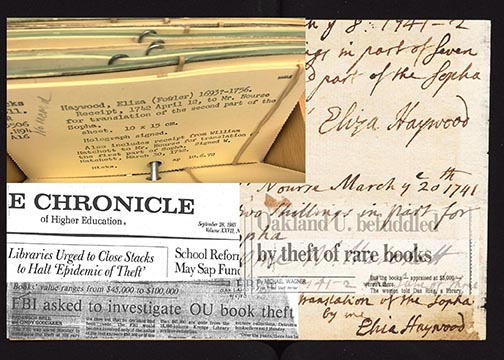
In March, Rebecca Fenning Marschall, Nina Schneider, Anna Chen, and Oakland University (OU) librarians Emily Spunaugle and Molly McGuire organized a two-day joint conference, “Item Not Found: Accounting for Loss in Libraries, Archives, and Other Heritage and Memory Organizations.” The conference was anchored by keynote speakers Tamar Evangelestia-Dougherty, T-Kay Sangwand, and Gabriel Solís, and featured an outstanding lineup of panelists and moderators: Salma Albumeeiz, Laura Gray Blair, Kacie Lucchini Butcher, Thomas G. Lannon, David Luftig, Philip Menchaca, Elizabeth McAulay, Kristen J. Nyitray, Elspeth Olson, Juan Suárez Ontaneda, Katherine Phan, Dana Reijerkerk, Eira Tansey, and Lauren S. Turner. The audience response was also tremendous, with over 500 people who registered to attend the conference.
The Clark and OU’s partnership began with the discovery that a manuscript penned by Eliza Haywood that had gone missing from OU’s collections had ended up in the Clark’s collections. Emily Spunaugle had been researching Marguerite Hicks, a collector of 17th—19th-century British women writers, whose collection had been at OU since 1971. During her research, Emily discovered that many items from Hicks’s collection had been stolen from OU, and that one of them, the Haywood manuscript, had made its way to the Clark Library.
The joint conference grew out of our resulting collaboration, and as part of an ongoing effort to bring transparency to the effects and resonances of other kinds of loss. During the conference, speakers explored not only the loss of physical objects, but the loss of resources, support, and attendant knowledge, including topics ranging from the impact of climate change and archival silences to personal legacies and human loss.
At the same time, the talks frequently considered productive approaches to loss. In particular, collective advocacy and centering care can reframe our thinking about loss through prioritization of relationships and communities, and respect for the balance between the stories that creators tell about themselves and the historical record. These approaches allow for mitigation, cooperation, reconciliation, and radical acceptance as potential responses to loss. Our immense thanks to the speakers, moderators, and audience members for coming together to generate this wide-ranging, enriching, and thought-provoking examination of the causes, impacts and opportunities of items not found.
-Anna Chen, Head Librarian, William Andrews Clark Memorial Library, UCLA

